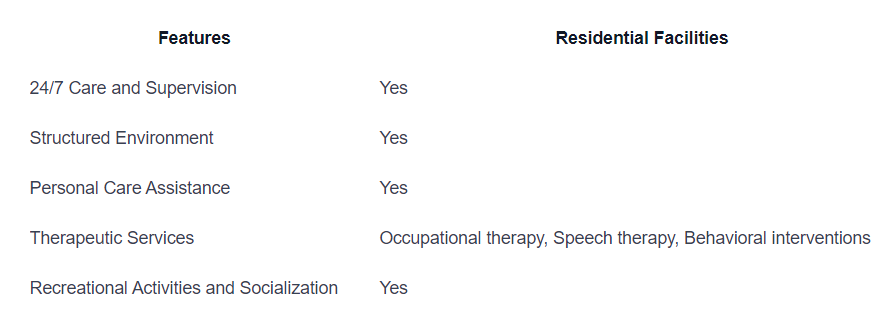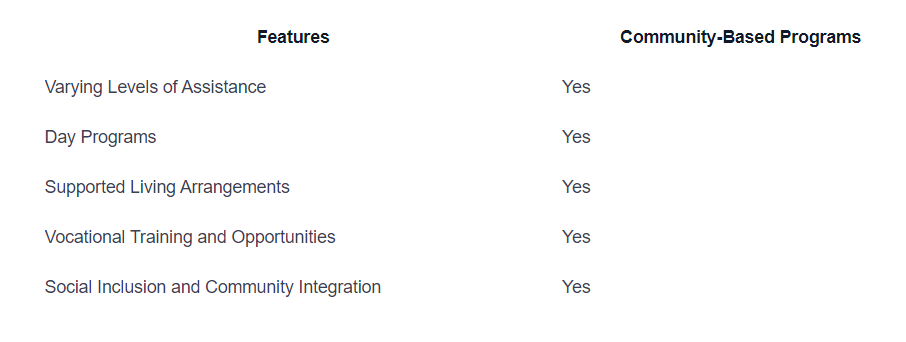What Happens to Severely Autistic Adults?
Unveiling the reality of severely autistic adults. Discover their challenges, care options, and how to ensure a quality life.

Understanding Severe Autism in Adulthood
When it comes to severe autism, understanding the challenges faced by adults with this condition is crucial. Severe autism is characterized by significant impairments in social interaction, communication, and repetitive behaviors. In adulthood, individuals with severe autism often require specialized care and support to lead fulfilling lives.
Characteristics of Severe Autism
Individuals with severe autism may exhibit a range of characteristics that impact their daily functioning. These characteristics can include:
- Limited verbal communication skills or a complete absence of speech.
- Difficulty in understanding and responding to social cues, leading to social isolation.
- Sensory sensitivities, where certain sounds, lights, or textures can be overwhelming or distressing.
- Repetitive behaviors, such as hand-flapping, rocking, or obsessive interests.
- Intellectual disability, with varying levels of cognitive functioning.
It's important to note that the severity of autism can vary from person to person, and individuals with severe autism may present with a combination of these characteristics.
Challenges Faced by Severely Autistic Adults
Severely autistic adults face numerous challenges in their daily lives, often requiring ongoing support and assistance. Some of the common challenges include:
- Communication difficulties: Limited verbal skills or a lack of speech can make it challenging for adults with severe autism to express their needs, wants, and feelings effectively. This can lead to frustration and difficulty in forming meaningful relationships.
- Social interaction: Difficulties in understanding social cues and engaging in reciprocal communication can make it challenging for severely autistic adults to establish and maintain social relationships. This can result in feelings of isolation and exclusion from community interactions.
- Daily living skills: Severely autistic adults may struggle with activities of daily living, such as personal hygiene, meal preparation, and managing personal finances. These challenges often require ongoing support and assistance to maintain a good quality of life.
- Sensory sensitivities: Many individuals with severe autism experience heightened sensory sensitivities, making certain environments or sensory stimuli overwhelming. This can lead to anxiety, meltdowns, or avoidance of certain situations.
- Behavioral challenges: Repetitive behaviors and difficulty adapting to changes in routine are common challenges faced by severely autistic adults. These behaviors may require behavioral interventions and support to manage and minimize their impact on daily life.
Understanding the characteristics and challenges faced by severely autistic adults is crucial in order to provide appropriate support and services. By recognizing their unique needs, we can work towards creating a more inclusive and supportive environment that allows these individuals to live fulfilling lives.
Transitioning to Adulthood
As individuals with severe autism reach adulthood, they face unique challenges that require appropriate support systems and continued care. Transitioning from adolescence to adulthood is a critical period that necessitates careful planning and assistance to ensure a smooth and successful transition.
Support Systems for Transitioning
Support systems play a crucial role in helping individuals with severe autism navigate the transition to adulthood. These systems involve a multidisciplinary approach, involving professionals such as educators, therapists, social workers, and healthcare providers. Their collective expertise helps create a comprehensive plan tailored to the individual's needs.
The support systems for transitioning vary depending on the local resources and services available. Below are some common components of support systems:
- Educational Transition Services: Educational institutions often provide transition services to help students with severe autism prepare for adulthood. These services may include vocational training, life skills development, and assistance in setting post-graduation goals.
- Transition Coordinators: Transition coordinators act as a central point of contact, connecting individuals with severe autism to various resources and services. They help coordinate assessments, develop transition plans, and provide guidance throughout the process.
- Family Involvement: Families play a crucial role in the transition process. Their involvement and support are essential in advocating for their loved ones and ensuring their needs are met. Family support groups and counseling services can provide valuable guidance and emotional support during this period of change.
- Collaboration with Community Organizations: Collaborating with community organizations, such as autism support groups, disability advocacy organizations, and social service agencies, can provide additional resources, networking opportunities, and assistance in accessing community-based programs.
Importance of Continued Care and Assistance
Continued care and assistance are vital for individuals with severe autism as they transition into adulthood. While the specific needs may vary, it is essential to establish a long-term plan that addresses medical, therapeutic, and social support requirements.
Continued care includes regular medical check-ups and monitoring of any co-occurring medical conditions. This may involve consultations with healthcare professionals specializing in autism spectrum disorder (ASD) and related conditions. It is important to ensure access to appropriate healthcare services that understand the unique needs of individuals with severe autism.
Additionally, ongoing therapeutic interventions, such as behavioral therapy, occupational therapy, and speech therapy, may be necessary to support skill development, communication, and independence. These therapies can help individuals with severe autism navigate daily living activities and enhance their quality of life.
Furthermore, social support and inclusion are crucial components of continued care. Participation in community-based programs, social groups, and recreational activities can provide opportunities for social interaction, skill-building, and a sense of belonging.
By establishing comprehensive support systems and prioritizing continued care and assistance, individuals with severe autism can navigate the challenges of adulthood with the necessary resources and guidance. These efforts contribute to ensuring a fulfilling and meaningful life for individuals with severe autism as they transition into adulthood.
Living Arrangements and Care Options
When it comes to severely autistic adults, finding suitable living arrangements and care options is crucial for ensuring their well-being and quality of life. Here, we will explore two common options: residential facilities and community-based programs.
Residential Facilities
Residential facilities are designed to provide round-the-clock care and support for severely autistic adults who require intensive assistance. These facilities offer a structured and supervised environment where individuals can receive comprehensive care tailored to their specific needs.
In residential facilities, trained staff members are available to assist with daily activities such as personal care, medication management, and meal preparation. These facilities often provide a range of therapeutic services, including occupational therapy, speech therapy, and behavioral interventions. The goal is to create a safe and supportive environment that promotes the development and independence of individuals with severe autism.
Here is a comparison of some typical features of residential facilities:

Community-Based Programs
Community-based programs offer another option for severely autistic adults who may not require 24/7 care but still benefit from support and assistance. These programs focus on integrating individuals into the community while providing the necessary resources and services to help them thrive.
These programs can vary widely in their structure and offerings. Some may provide day programs where individuals participate in structured activities, vocational training, and socialization opportunities. Others may offer supported living arrangements where individuals reside in their own homes or apartments with varying levels of assistance and supervision.
Community-based programs often prioritize promoting independence, social inclusion, and self-advocacy skills. They may collaborate with local organizations and businesses to create vocational opportunities for individuals with severe autism, enabling them to develop skills and contribute to their communities.
Here is a comparison of some typical features of community-based programs:

Both residential facilities and community-based programs offer valuable options for the care and support of severely autistic adults. The choice between the two depends on the individual's specific needs, level of independence, and available resources. It is important to carefully consider these options and consult with professionals who specialize in autism care to determine the most suitable living arrangement for each individual.
Vocational Opportunities and Employment
For individuals with severe autism, vocational opportunities and employment can play a significant role in their overall well-being and quality of life. While the level of support required may vary, there are programs and training options available to help individuals with severe autism find meaningful work and contribute to society.
Supported Employment Programs
Supported employment programs are designed to provide assistance and support to individuals with disabilities, including severe autism, in finding and maintaining employment. These programs offer a range of services tailored to the individual's needs, such as job coaching, skills training, and ongoing support.
The goal of supported employment programs is to help individuals with severe autism successfully integrate into the workforce and develop the necessary skills to thrive in a work environment. Job coaches work closely with participants, providing guidance and support to help them navigate job responsibilities, social interactions, and other challenges they may encounter.
These programs often collaborate with employers to create inclusive work environments that accommodate the specific needs of individuals with severe autism. By fostering understanding and providing necessary accommodations, supported employment programs help individuals with severe autism overcome barriers and achieve success in the workplace.
Vocational Training
Vocational training is another avenue for individuals with severe autism to develop skills and gain experience that can lead to employment opportunities. These training programs focus on teaching specific job-related skills that align with the individual's interests and abilities.
Vocational training programs may include hands-on learning experiences, workshops, and classroom instruction. The training curriculum is often tailored to the individual's strengths and interests, providing them with the necessary tools to pursue a career in a particular field.
In addition to job-specific skills, vocational training programs also aim to enhance social and communication skills, problem-solving abilities, and workplace etiquette. This comprehensive approach equips individuals with the necessary skills to succeed in the workplace and fosters their independence.
By providing individuals with severe autism access to supported employment programs and vocational training, society can create equal opportunities for employment and help individuals with severe autism lead fulfilling lives. These programs empower individuals with the skills and support they need to navigate the workforce, contribute their unique talents, and achieve personal and professional growth.
Legal and Financial Considerations
When it comes to severely autistic adults, there are important legal and financial considerations that need to be addressed to ensure their well-being and protect their rights. This section explores two key aspects: guardianship and decision-making, as well as financial assistance and planning.
Guardianship and Decision-Making
For individuals with severe autism, guardianship may be necessary to make important decisions on their behalf. Guardianship grants legal authority to a designated person or entity to make decisions related to healthcare, education, and other important aspects of life.
The process of obtaining guardianship involves filing a petition with the court and providing evidence of the individual's incapacity to make decisions independently. The court will then evaluate the circumstances and determine the need for guardianship. It's essential to consult with an attorney who specializes in disability law to navigate this process effectively.
Additionally, alternatives to full guardianship, such as limited guardianship or supported decision-making, may be considered based on the individual's abilities and level of support needed. These options aim to balance autonomy and protection, allowing individuals with severe autism to participate in decision-making to the fullest extent possible.
Financial Assistance and Planning
Financial considerations play a significant role in ensuring the long-term care and support of severely autistic adults. The cost of specialized services, therapies, and living arrangements can be substantial, making it essential to explore available financial assistance and plan for the future.
One option for financial assistance is through government programs. Supplemental Security Income (SSI) and Social Security Disability Insurance (SSDI) provide financial support for individuals with disabilities based on their financial need and work history. These programs can help cover basic living expenses and provide access to healthcare services.
Additionally, special needs trusts can be established to manage and protect the financial assets of severely autistic adults. These trusts allow for the management of funds while preserving eligibility for government benefits. Consulting with a qualified financial planner or attorney who specializes in special needs planning is crucial to set up the appropriate trust structure.
Planning for the financial future of a severely autistic adult should also involve considering life insurance policies, estate planning, and identifying potential sources of funding for ongoing care and support. It's important to review and update these plans regularly to accommodate changing circumstances and ensure the individual's financial security.
By addressing the legal and financial considerations associated with severe autism in adulthood, individuals and their families can establish a framework that safeguards their rights, provides necessary support, and secures their financial well-being. Seeking professional guidance and staying informed about available resources is key to navigating these complex matters effectively.
Ensuring Quality of Life
When it comes to severely autistic adults, ensuring a high quality of life involves addressing their specific needs and providing appropriate support. Two essential aspects of this are access to healthcare services and opportunities for social inclusion and recreational activities.
Access to Healthcare Services
Severely autistic adults often require specialized healthcare services to address their unique needs and challenges. Access to appropriate healthcare ensures that individuals receive the necessary support for their physical and mental well-being. This includes regular medical check-ups, therapeutic interventions, and access to medications if required.
In the case of severely autistic adults, healthcare services may involve a multi-disciplinary approach, involving professionals such as neurologists, psychiatrists, psychologists, and speech and occupational therapists. These professionals work together to develop individualized treatment plans and provide ongoing support.

Regular communication between healthcare providers, caregivers, and family members is crucial to ensure that the healthcare needs of severely autistic adults are met effectively. Additionally, staying informed about the latest research and advancements in autism care can help individuals make informed decisions about their loved ones' healthcare.
Social Inclusion and Recreational Activities
Social inclusion and engagement in recreational activities are vital for the overall well-being and happiness of severely autistic adults. These activities provide opportunities for social interaction, skill development, and personal growth.
Creating inclusive environments where individuals with severe autism can participate in recreational activities is essential. This can involve community programs, support groups, and specialized recreational centers that cater to their specific needs. These activities may include art classes, music therapy, sports programs, and social skills training.

Promoting social inclusion also involves educating the community about autism and fostering acceptance and understanding. This can be achieved through awareness campaigns, workshops, and community events focused on autism education and inclusion.
By ensuring access to healthcare services and promoting social inclusion and recreational activities, severely autistic adults can have an improved quality of life. It is important to prioritize their individual needs, preferences, and interests to create a supportive and inclusive environment that enhances their overall well-being.
Sources
https://www.abtaba.com/blog/severely-autistic-adults
https://www.autismparentingmagazine.com/autistic-adults-when-parents-die/
https://www.verywellhealth.com/what-is-severe-autism-260044
Similar articles
We’re here to help you

Our team is here to assist you in this process. Contact us for any assistance.
it’s easy to apply
We Accept Most Insurances
Our in-network insurance partnerships make ABA therapy more accessible to families throughout our service areas.







Our Insurance Process
We'll request your insurance details to help us verify your plan's coverage for ABA therapy. Once we've received this information, we'll walk you through your benefits, including copayments, deductibles and out-of-pocket maximums, so you know what to expect in advance.
Our team will then handle the preauthorization and all the necessary paperwork.
.svg)





















.jpeg)


































.jpeg)




.jpeg)







.jpeg)











.jpeg)
















